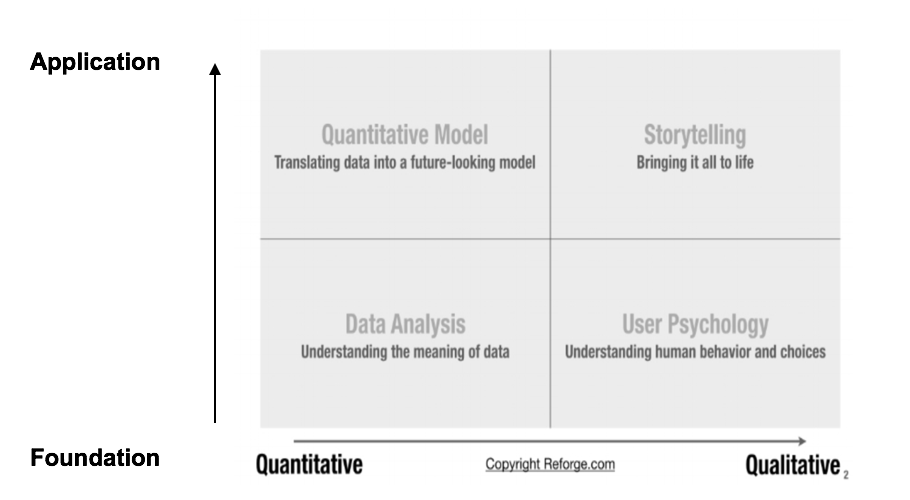I read Dan Pink’s book A Whole New Mind back in 2012. For a person who’s spent years in engineering tackling logical and rational problems, the idea that the future belonged to the creative type was quite an eye-opener.
It’s now 6 years later and automation is rapidly advancing the creative economy.
I was going through Brian Balfour’s blog which provides interesting insights on Growth Marketing, and realized that the thinking framework could easily be applied to growth in general (Growth of a startup/Growth of a person).
His quadrant chart looks like this:
Since I came to Kenya and I’ve been scrambling around the intersection of exploratory data analysis (EDA) and user psychology, but where I really want to exist is at the intersection of predictive data analysis and storytelling because that’s where the fun stuff lies.
One important thing my foray into data analysis has taught me is to carefully analyze how the data was collected in the first place. Sometimes the collection method naturally biases the data. For example, I attended a talk once where the speaker presented a study on supermarket receipts and showed a large portion of them had three items or less. When he was asked how he collected the receipts, he admitted he had to take them from the trash can – which says something about his level of motivation – but also introduces a bias because people are more likely to throw out receipts with only a few items.
Besides a selection bias, there’s also the reporting bias. This involves a skew in the availability of data, and that could easily feed into and reinforce cognitive biases like The Survivorship Bias as stated by Rolf Dobelli in The Art of Thinking Clearly. Basically, because we’re surrounded by glossy pictures of success and not enough stories of failures, we tend to overestimate our chances of the former.
Seeing how the idea applies to startups, I’ve learnt that the best ones are those that make data-driven decisions. Whether the information is collected via API’s or by doing market research and focus groups, if you’re a business you need to learn to listen to your customers.
Unfortunately, Steve Jobs set a bad precedent when he said that “It’s really hard to design products by focus groups. A lot of times, people don’t know what they want until you show it to them.”
You’ll see many examples of people not customizing their products and services to the market needs because of that one quote.
Given…Steve Jobs was a genius.
But not everybody in the entrepreneurial world is.
So your biggest source of information should be the market. If the market tells you they hate a product or love it but won’t pay for it, there’s no need to start whining about how the market don’t understand you…just modify it or kill it, and find something that works.
Then when it comes to user psychology, you’ll see a lot of people trying to sell the African market products that are more suited for the West, because they’re trendy. Instead of putting on our gum boots, wading through the newly-formed lakes and rivers spotting the city of Nairobi thanks to the rains and actually paying attention to the market, we sit in our offices and try to make assumptions about what the market wants and needs.
Finally, I found myself thinking, how do I integrate these skills into my own life to optimize my energy and productivity, and I realized it starts with data tracking and understanding my own psychology;
– Tracking the number of hours it takes to finish a report
– Tracking expenses
– Seeing how various environmental factors affect my productivity (for e.g. I’m more productive in a place with white noise than in a quiet place or in the office because my ears would naturally pick conversations that are relevant to what I do)
-Understanding how my mood affects my spending behavior/productivity/eating habits
So there’s a thinking framework you can start adopting in your life. What are your thoughts?
Let me know on twitter @ahechoes.

